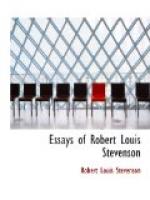of yore, to breathe of money; seemed still perfectly
sure of himself and certain of his end. Yet he
was then upon the brink of his last overthrow.
He had set himself to found the strangest thing in
our society: one of those periodical sheets from
which men suppose themselves to learn opinions; in
which young gentlemen from the universities are encouraged,
at so much a line, to garble facts, insult foreign
nations and calumniate private individuals; and which
are now the source of glory, so that if a man’s
name be often enough printed there, he becomes a kind
of demigod; and people will pardon him when he talks
back and forth, as they do for Mr. Gladstone; and
crowd him to suffocation on railway platforms, as they
did the other day to General Boulanger; and buy his
literary works, as I hope you have just done for me.
Our fathers, when they were upon some great enterprise,
would sacrifice a life; building, it may be, a favourite
slave into the foundations of their palace. It
was with his own life that my companion disarmed the
envy of the gods. He fought his paper single-handed;
trusting no one, for he was something of a cynic; up
early and down late, for he was nothing of a sluggard;
daily earwigging influential men, for he was a master
of ingratiation. In that slender and silken fellow
there must have been a rare vein of courage, that
he should thus have died at his employment; and doubtless
ambition spoke loudly in his ear, and doubtless love
also, for it seems there was a marriage in his view
had he succeeded. But he died, and his paper
died after him; and of all this grace, and tact, and
courage, it must seem to our blind eyes as if there
had come literally nothing.
These three students sat, as I was saying, in the
corridor, under the mural tablet that records the
virtues of Machean, the former secretary. We
would often smile at that ineloquent memorial, and
thought it a poor thing to come into the world at all
and leave no more behind one than Machean. And
yet of these three, two are gone and have left less;
and this book, perhaps, when it is old and foxy, and
some one picks it up in a corner of a book-shop, and
glances through it, smiling at the old, graceless
turns of speech, and perhaps for the love of Alma
Mater (which may be still extant and flourishing)
buys it, not without haggling, for some pence—this
book may alone preserve a memory of James Walter Ferrier
and Robert Glasgow Brown.
Their thoughts ran very differently on that December
morning; they were all on fire with ambition; and
when they had called me in to them, and made me a
sharer in their design, I too became drunken with
pride and hope. We were to found a University
magazine. A pair of little, active brothers—Livingstone
by name, great skippers on the foot, great rubbers
of the hands, who kept a book-shop over against the
University building—had been debauched to
play the part of publishers. We four were to
be conjunct editors, and, what was the main point




